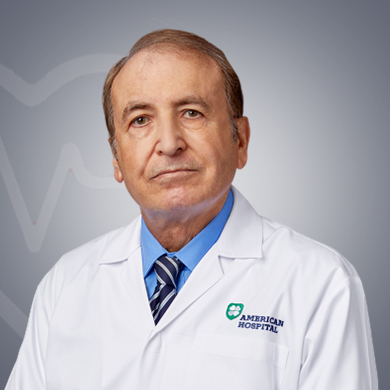
35 Years of experience
Speaks: English
One of the eminent ophthalmologists, Dr Nadim Habash treats a variety of conditions with high success rates. The conditions treated are as follows::
Some of the most common eye conditions that the ophthalmologist treats are Diabetic Retinopathy, Dry eye Syndrome, and Conjunctivitis. The doctor might prescribe some antibiotics for bacterial conjunctivitis. Antibiotics might help lessen the length of infection. For dry eyes, the doctor will do physical examinations, and treatment may include use of artificial tears and reduce tear drainage.
Eye conditions can produce the below-listed conditions However, symptoms might vary from person to person. Every condition has its symptoms.:
It is important to go for routine eye examinations to diagnose the condition. If you have not undergone an eye examination for more than one year, you must consult your eye doctor. It is important to remain aware of the warning signs which can help you make the right decision for your eyesight.
You can reach Dr Nadim Habash from 10 am to 5 pm on Monday to Saturday. The average working hours of the doctor are 47 hours a week.
The popular procedures that Dr.Nadim Habash performs are listed below:
LASIK is the most common type of eye surgery that fixes issues with the way the eyes focus. It could be an alternative to glasses and contact lenses. During this surgery, a special kind of cutting laser is utilized to change the shape of the clear tissue in the cornea to improve vision.

Share Your Experience about Dr. Nadim Habash

Ophthalmologists are doctors who handle the medical aspects of eye care, such as treatment, surgery, and prescription of glasses and contact lenses as well as medicines for different eye problems. Some ophthalmologists work with other eye care team, coordinate with optometrists as well as other medical professionals to provide care for chronic eye conditions. Ophthalmologists also actively involved in eye surgeries and conduct research to find the causes and treatment of eye problems and vision issues. Apart from this, ophthalmologists also see health problems that not linked to the eyes but might be diagnosed during a routine eye examination.
Some of the most common test performed for the diagnosis of eye conditions are:
An opthalmologist may perform a number of different tests to evaluate your vision and diseases. Each test will evaluate some specific aspect of vision. The doctor may direct a beam of light in your eyes to look for any abnormalities in the retina. They design the treatment plan posts after evaluating the test reports.
Below are some situations when you need to see an opthalmologist:
The above signs and symptoms should not be ignored and must be discussed with an eye specialist because the diagnosis of eye condition at an early stage will help the doctor to plan effective treatment, They may also discuss your symptoms with other doctors to determine the right treatment.